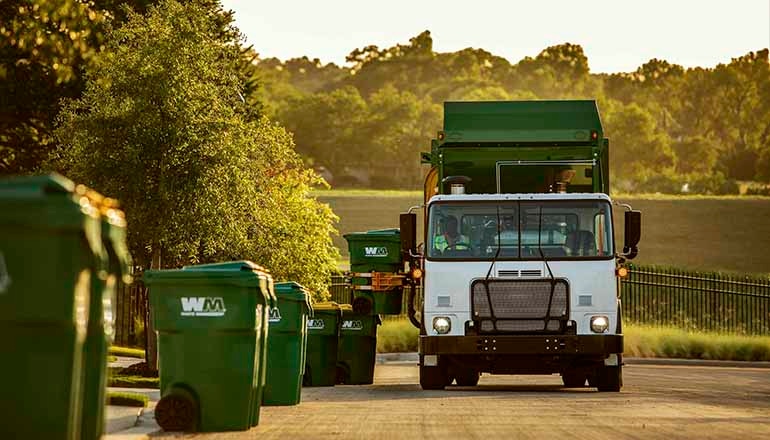WM Sees 2019 Growth Despite Headwinds, Looks Ahead to 2020
During a call with investors, Waste Management shed light on the pending Advanced Disposal acquisition.

During a February 13 call with investors, Houston-based Waste Management, Inc. (WM) reported strong revenue growth for Q4 2019 from the collection and disposal business despite recycling commodity price headwinds.
Revenues for Q4 2019 were $3.85 billion, compared with $3.84 billion for the same 2018 period. Net income for the quarter was $447 million, or $1.05 per diluted share, compared with net income of $531 million, or $1.24 per diluted share, for the fourth quarter of 2018. On an adjusted basis, earnings per diluted share were $1.19 for the fourth quarter of 2019, compared with $1.13 for the fourth quarter of 2018.
A sharp decline in market prices for recycled commodities led to a $104 million year-over-year decline in revenue from WM’s recycling line of business in Q4 2019 and a $244 million decline for the full year.
“We are proud of how Waste Management performed in 2019,” said WM President and CEO Jim Fish during the call with investors. “We continued our focus on optimizing our traditional solid waste business, developing our people and investing in technology to better serve our customers, and we’re confident these are the right focus points to deliver long-term growth for the company. The results are evident in our four-year topline growth, which was 3.6 percent, despite a negative $318 million drag in commodity prices in our recycling line of business and a negative $23 million swing from the collection of renewable energy credits.”
Fish explained that landfill pricing was one of the bright spots in 2019, as WM achieved its “best-ever,” full-year municipal solid waste (MSW) landfill pricing in 2019, exceeding a 3 percent yield in every quarter, culminating in a fourth quarter MSW yield of 4.5 percent.
The company’s collection and disposal business saw operating EBITDA grow by 8.5 percent and its operating EBITDA margin expand by 70 basis points. In 2019, WM’s overall operating EBITDA grew by 4 percent despite lower-than-expected market prices for recycled commodities and renewable energy credits.
“We’re forecasting another record year for operating EBITDA in 2020, with growth of 5.2 percent at the midpoint of our guidance range,” noted Fish. “We expect to achieve this growth from continued strong performances in collection and disposal business.”
In 2019, Waste Management spent $527 million on acquisitions, an indicator of the active mergers and acquisitions (M&A) environment. And the closing of the Advanced Disposal Services (ADS) acquisition is expected to be the highlight of 2020.
“We are excited as we near the close of the transaction, and we have great confidence in the potential of the combined organization,” said Fish. “We anticipate that we will obtain antitrust regulatory approval by the end of March and close soon thereafter.”
“Our integration team has been working hard preparing for this close, and the team is positioned to move quickly to integrate ADS operations and to achieve our targeted synergies,” he added.
WM’s adjusted fourth quarter 2019 results exclude negative impacts of $0.07 per diluted share for non-cash charges to write off certain assets, $0.05 per diluted share from interest and advisory costs incurred in connection with the pending acquisition of ADS and $0.02 per diluted share from costs incurred to support its plan to implement a new enterprise resource planning system.
For the full-year 2019, WM reported revenues of $15.46 billion, compared with $14.91 billion for 2018. Earnings per diluted share were $3.91 for the full-year 2019, compared with $4.45 for the full-year 2018. On an adjusted basis, earnings per diluted share were $4.40 for the full-year 2019, versus $4.20 for the full-year 2018.
“Our strong results demonstrate that we are investing in the right areas,” said Fish in a statement. “Our collection and disposal business operating EBITDA grew by 8.5 percent in 2019 and operating EBITDA margin expanded by 70 basis points. This strong operating EBITDA growth translated into an 8.5 percent increase in net cash provided by operations in 2019.”
“We also are pleased to have been recognized for the fourth consecutive year on CDP’s ‘A-List’ for leading effort toward a low-carbon future. We have had a longstanding commitment to environmental transparency and are proud of the progress we have achieved on reducing emissions and mitigating climate risk,” added Fish.
Here are some additional highlights from Q4 and the full-year 2019:
Total operating EBITDA was $1.05 billion for Q4 2019 and $4.28 billion for the full year. Adjusted operating EBITDA was $1.12 billion for the fourth quarter of 2019 and $4.38 billion for the full year. On a year-over-year basis, adjusted operating EBITDA grew $28 million, or 2.6 percent, in Q4 and $167 million, or 4 percent, for the year. Adjusted operating EBITDA margin improved 70 basis points in the fourth quarter and 10 basis points for the full year.
Operating EBITDA in the collection and disposal business, adjusted on the same basis as total company operating EBITDA, was $1.33 billion for Q4 2019 and $5.13 billion for the full year. On a year-over-year basis, adjusted operating EBITDA in WM’s collection and disposal business grew $120 million, or 9.9 percent, in Q4 and $402 million, or 8.5 percent, for the year. Adjusted operating EBITDA margin in WM’s collection and disposal business improved 190 basis points in the fourth quarter and 70 basis points for the full year.
Revenue growth was driven by strong organic growth in WM’s collection and disposal business, which contributed $88 million of incremental revenue. For the full year, yield and volume growth in the company’s collection and disposal business contributed $706 million of incremental revenue.
Internal revenue growth from yield for collection and disposal operations was 3.2 percent in Q4 2019 and 2.8 percent for the full year, compared with 2.3 percent for both Q4 and the full year of 2018.
Collection and disposal internal revenue growth from volume was negative 0.6 percent in the fourth quarter of 2019. Total company internal revenue growth from volume, which includes recycling and other businesses, was negative 0.4 percent in the fourth quarter. For the full-year 2019, collection and disposal internal revenue growth from volume was 2.6 percent, and total internal revenue growth from volume was 2.3 percent.
Throughout 2019, strong revenue growth from the collection and disposal business was partially offset by recycling commodity price headwinds. The sharp decline in market prices for recycled commodities led to a $104 million year-over-year decline in revenue from WM’s recycling line of business in the fourth quarter of 2019 and a $244 million decline for the full year.
“The team is focused on opportunities to continue to improve and optimize our collection and disposal businesses,” said WM Chief Operating Officer John Morris during the call with investors. “We plan to improve our overall residential line of business and operating costs with a focus on labor, technology to help improve routing and maintenance service delivery optimization focused on repairs and maintenance costs.”
Operating EBITDA in the recycling line of business declined $12 million when comparing Q4 2019 with the prior year period. For the full year, operating EBITDA in WM’s recycling line of business was essentially flat when compared to the full-year 2018. WM achieved this outcome despite a 35 percent decline in market prices for recycled commodities during 2019.
“Our recycling performance demonstrates the success we are having in restructuring our recycling contracts to a fee-for-service model,” explained Morris. “We will also continue to make strides on improving our business through the use of technology. At our Chicago MRF of the Future, we expect to be fully operational by the second quarter. This plant is designed to be capable of separating high-quality material with technology through positive and intelligent sorting to generate the desired end product. Looking toward 2020, given the expected lowered commodity price levels in the current environment, we expect a minimal impact on overall results in recycling within the first half of the year.”
Operating EBITDA from the sale of renewable natural gas credits declined $12 million from Q4 2018 due to lower market values. For the full-year 2019, operating EBITDA from the sale of renewable natural gas credits declined $23 million from 2018.
As a percentage of revenue, SG&A expenses were 11.6 percent in Q4 2019, or 10.7 percent on an adjusted basis, compared to 9.6 percent in Q4 2018. For the full year, as a percentage of revenue, SG&A expenses were 10.6 percent, or 10.3 percent on an adjusted basis, compared to 9.7 percent for the full-year 2018.
Net cash provided by operating activities was $1.02 billion in Q4 2019, compared to $912 million in Q4 2018. Capital expenditures were $286 million in Q4 2019, compared to $454 million in Q4 2018.
Free cash flow was $756 million, including $20 million in asset sales, in the fourth quarter of 2019, compared to $560 million, including $102 million in asset sales, in the fourth quarter of 2018. For the full year, free cash flow was $2.11 billion, including $49 million in asset sales, compared to $2.08 billion, including $208 million in asset sales, for the full-year 2018.
WM spent $527 million on acquisitions of solid waste businesses during 2019, $9 million of which was spent in the fourth quarter. However, during the call with investors, Chief Financial Officer Devina Rankin said: “Given our focus on the integration of ADS, we expect tuck-in acquisitions in 2020 to be lower than what we have seen in the last few years and more in line with our historical target of $100 million to $200 million annually.”
2020 Outlook
Rankin emphasized that WM’s revenue earnings and cash flow guidance does not include the anticipated impacts of acquiring ADS.
“However, it is important to note that our free cash flow guidance does include an initial estimate of the incremental interest cost we will incur for the debt raised to fund the transaction. We plan to update the remaining components of our outlook, including taxes and EPS, following the close of the acquisition,” she said.
Key highlights for 2020 include:
Adjusted operating EBITDA is expected to be between $4.56 billion and $4.66 billion for the full year.
Revenue growth: Core price is expected to be 4 percent or greater. Internal revenue growth from yield on the collection and disposal business is expected to be about 2.5 percent. Internal revenue growth from volume is expected to be about 1.5 percent.
Free cash flow is projected to be between $2.15 billion and $2.25 billion, exclusive of transaction and advisory costs incurred for the acquisition of Advanced Disposal.
Capital expenditures are expected to be in the range of $1.7 billion to $1.8 billion.
The board of directors has indicated its intention to increase the dividend by $0.13 per share to $2.18 on an annual basis for an approximate annual cost of $920 million. This represents the 17th consecutive year of increases in the company’s per share dividend. The board must separately approve and declare each dividend.
WM has $1.32 billion remaining on its existing board of directors’ authorization to repurchase common stock. Given the strength of the company’s free cash flow performance in 2019 and outlook for 2020, WM expects to restart its share repurchase program in the first quarter.
“Our hardworking team members made 2019 a successful year, and 2020 is set to be an outstanding year as we drive organic growth in the solid waste business and anticipate closing on the acquisition of Advanced Disposal,” concluded Fish. “We will continue to focus on the long-term growth of our business through investments in our team members, technology and asset network. We are confident that we are positioned for success in 2020 and beyond.”
About the Author(s)
You May Also Like




